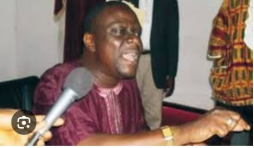The political landscape in Liberia is experiencing a growing wave of discontent directed at President Joseph Nyuma Boakai and the ruling Unity Party (UP). This dissatisfaction stems from perceived unfair treatment in political appointments following the 2023 presidential elections, with several key political figures expressing their grievances publicly. The complaints originate from various quarters, including Senator James Biney of Maryland County, Senator Crayton Duncan, and even the Minister of Internal Affairs, Francis Sakila Nyumalin Sr. The heart of the issue lies in the perceived imbalance in appointments, particularly considering the significant electoral support received by the UP from counties like Margibi, which delivered the third-highest number of votes for the party. This perceived ingratitude has fueled the growing chorus of criticism against the Boakai administration.
Adding fuel to the fire, former Bomi County Senator Sando Johnson, now a Legislative Liaison in the Boakai administration, openly criticized the ruling party, labeling it “ungrateful.” Johnson’s remarks were triggered by a controversial statement made by Unity Party Chairman, Rev. J. Luther Tarpeh, who asserted that only the Unity Party and the Congress for Democratic Change (CDC) are genuine political parties in Liberia, relegating all other parties to the status of “helping verbs.” Johnson’s frustration was palpable as he accused the UP of consuming all the spoils of power, leaving nothing for their supporters. He also expressed concern that President Boakai, despite receiving sound advice, is being misled by negative influences, whom he referred to as “vampires.” Johnson’s criticism extends to the UP’s lack of tangible assets, pointing out that despite 14 years in power, the party does not even own a headquarters building.
Rev. Tarpeh attempted to clarify his controversial remarks, claiming they were taken out of context and were intended as a lighthearted exchange with Representative Musa Bility. He explained that the “helping verbs” analogy was meant to illustrate the historical dominance of the UP and CDC in Liberian politics, with other parties often aligning themselves with one of these two major forces. He insisted his intention was not to dismiss the relevance of smaller parties, but rather to acknowledge the existing political landscape. However, this clarification has done little to quell the growing criticism.
The controversy surrounding Rev. Tarpeh’s remarks has sparked a wider debate about political tolerance and the role of smaller parties in Liberia’s multiparty democracy. Critics argue that such dismissive language undermines the democratic process and disrespects the contributions of smaller parties to the nation’s political evolution. The situation highlights the delicate balance between acknowledging the historical influence of major parties and ensuring inclusivity in a multiparty system. The ongoing backlash underscores the sensitivity surrounding political discourse in Liberia and the importance of respecting the diverse voices within the political arena.
This growing dissatisfaction within the ruling party and among its supporters presents a significant challenge for President Boakai’s administration. The accusations of unfair treatment and ingratitude could potentially erode the UP’s support base and create further divisions within the party. The controversy also raises questions about the internal dynamics within the UP and the influence of various advisors on President Boakai’s decision-making. The president’s ability to address these concerns and bridge the growing divide within the party will be crucial for maintaining political stability and effectively governing the country.
The situation in Liberia underscores the complex interplay of political power, patronage, and the challenges of maintaining unity within a ruling party. The unfolding events will likely have significant implications for the future of the Unity Party and the political landscape of Liberia as a whole. The outcome of this internal struggle within the UP, and the broader debate about the role and recognition of smaller parties, will undoubtedly shape the trajectory of Liberian politics in the coming years. The ongoing criticism and expressions of discontent signal a potential shift in the political dynamics and could pave the way for new alliances and realignments in the lead-up to future elections.


